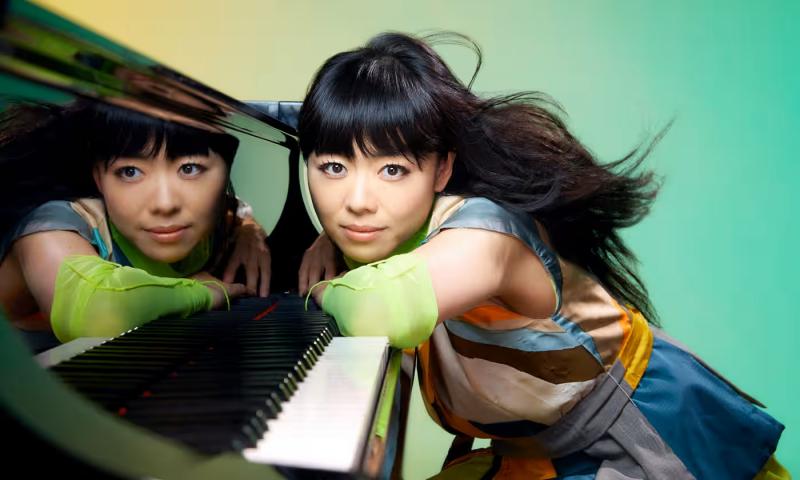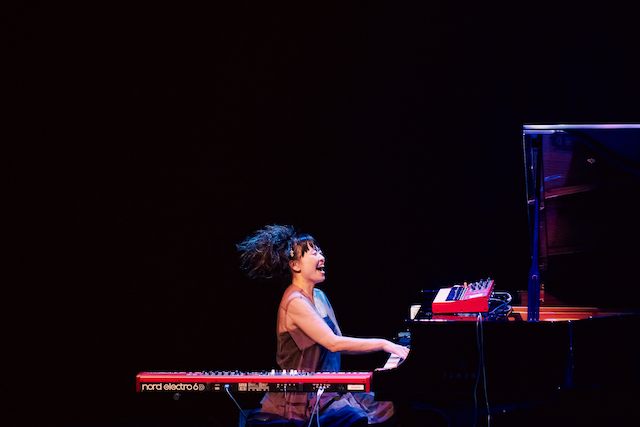Hiromi's Sonicwonder, EFG London Jazz Festival, Barbican review - keyboard fireworks from a brilliantly versatile jazz pianist | reviews, news & interviews
Hiromi's Sonicwonder, EFG London Jazz Festival, Barbican review - keyboard fireworks from a brilliantly versatile jazz pianist
Hiromi's Sonicwonder, EFG London Jazz Festival, Barbican review - keyboard fireworks from a brilliantly versatile jazz pianist
Two very different sides of this extraordinary musician's creativity

To watch virtuoso jazz pianist Hiromi perform is to experience a vast weather system of sound; at some moments exuberant hailstorms of notes alternate with thunderous chords, at others, sombre atonal passages resolve into a burst of sunshine.
By any standards she’s a remarkable stage presence; at the same time as segueing effortlessly between three keyboards, she laughs, stands up and sits down, conducts the other performers and sometimes claps along. Whatever you think of this party, she’s certainly having a ball.
It’s the complete lack of self-consciousness that contributes to what – from this critic’s perspective – makes her one of the most remarkable piano talents of our time. Born in Hamamatsu Japan 44 years ago, Hiromi Uehara was performing with the Czech Philharmonic Orchestra by the time she was 14 and with Chick Corea when she was 17. Since graduating from the Berklee College of Music in Boston – where she was mentored by the late, great Ahmad Jamal – she has performed in jazz festivals all over the world. When the Tokyo Olympics had its opening ceremony in 2021, Hiromi’s display of keyboard acrobatics was one of its star turns.
For her appearance at the Barbican as part of the EFG London Jazz Festival she teamed up with two different bands. In the first half she played acoustic piano with classically-trained musicians for her London-based Hiromi: The Piano Quintet, in the second she performed with Hiromi’s Sonicwonder, featuring Adam O’Farrill on the trumpet, Gene Coye on drums, Hadrien Féraud on bass and a collaboration with songwriter Oli Rockberger.
As Hiromi explained to the audience, the works featured in her 2021 album Silver Lining Suite were written during lockdown when “the only thing I could do was write music for piano and string quartet”. Certainly the pieces in the first half had a more intense, elegiac quality than the explosively extrovert performances that have made her name. In Isolation, the music began with a taut rhythmic motif played by Thomas Gould on the violin that was passed between the different instruments as Hiromi built up the lush harmonies. Though the feel was classical, gradually more anarchic jazz elements crept in, as, with a wicked smile at the audience she let rip with an ebullient improvisation that was finally reined in for the stark, rhythmically rigorous conclusion.Hiromi has a very different compositional voice from Gershwin, but like him she can fuse classical music and jazz to create a rich hybrid that thrillingly pushes performers to their limits. In Unknown there were points when the great crashing chords would not have seemed out of place in a Rachmaninoff piano concerto, while the viola player, Meghan Cassidy, was given yearning lyrical melodies that brought out the full subtle timbre of her instrument.

Yet improvisation was king throughout the evening, and whatever the mood, there was always going to be a moment when Hiromi broke away like a helium balloon of creativity. At points it felt that if she’d been allowed, she’d have still been there playing her heart out at 6 in the morning. Though every performer in the group had their chance to improvise too, not least cellist Gabriella Swallow who delivered a wonderful, harmonically surreal, bow-clattering response to Hiromi’s musical provocation. Gould also shone with stylistically versatile innovations that borrowed mischievously from the classical violin's repertoire.
The second half of the evening represented a substantive change in tone, ranging through Latin jazz, funk, fusion and electronica. Featuring numbers from her recently released album, Sonicwonderland, it was as breathtaking for its energy as for its brilliant versatility. Hiromi’s free-ranging style – which at certain points saw her playing left hand on the piano and right hand on any one of the two synthesisers next to her – was nicely anchored by O’Farrill’s introspective, intensely focused trumpet playing. At other points we watched her throwing giddy motifs back and forth with Féraud’s bass or rocking out as Coye improvised on the drums.
This is the second time I have seen Hiromi live – last time was in a large tent in the South West of France at the 2022 Marciac Jazz Festival where she delivered a dazzling solo rendition of Gershwin’s Rhapsody in Blue among other numbers. Both evenings were marked by her trademark sequences of repeated notes that built in comic intensity, dazzling pyrotechnic riffs, and an apparently infinite capacity for invention. Maybe it sounds perverse, but after the sheer power that she demonstrated in the first half of the Barbican concert, it would be fascinating to hear her Rachmaninov Piano Concerto No 2 – not least to see what havoc she could create with the cadenza. Though maybe even Hiromi would see that as a reinvention too far – after all, in the vast and colourful musical universe she has built for herself, there’s no shortage of other things to explore.
The future of Arts Journalism
You can stop theartsdesk.com closing!
We urgently need financing to survive. Our fundraising drive has thus far raised £49,000 but we need to reach £100,000 or we will be forced to close. Please contribute here: https://gofund.me/c3f6033d
And if you can forward this information to anyone who might assist, we’d be grateful.

Subscribe to theartsdesk.com
Thank you for continuing to read our work on theartsdesk.com. For unlimited access to every article in its entirety, including our archive of more than 15,000 pieces, we're asking for £5 per month or £40 per year. We feel it's a very good deal, and hope you do too.
To take a subscription now simply click here.
And if you're looking for that extra gift for a friend or family member, why not treat them to a theartsdesk.com gift subscription?
more New music
 Yazmin Lacey confirms her place in a vital soul movement with 'Teal Dreams'
Intimacy and rich poetry on UK soul star's second LP
Yazmin Lacey confirms her place in a vital soul movement with 'Teal Dreams'
Intimacy and rich poetry on UK soul star's second LP
 Solar Eyes, Hare & Hounds, Birmingham review - local lads lay down some new tunes for a home crowd
Psychedelic indie dance music marinated in swirling dry ice
Solar Eyes, Hare & Hounds, Birmingham review - local lads lay down some new tunes for a home crowd
Psychedelic indie dance music marinated in swirling dry ice
 The Lemonheads' 'Love Chant' is a fine return to form
Evan Dando finally gets back in the saddle with an album of new tunes
The Lemonheads' 'Love Chant' is a fine return to form
Evan Dando finally gets back in the saddle with an album of new tunes
 Music Reissues Weekly: Evie Sands - I Can’t Let Go
Diligent, treasure-packed tribute to one of Sixties’ America’s great vocal stylists
Music Reissues Weekly: Evie Sands - I Can’t Let Go
Diligent, treasure-packed tribute to one of Sixties’ America’s great vocal stylists
 'Deadbeat': Tame Impala's downbeat rave-inspired latest
Fifth album from Australian project grooves but falls flat
'Deadbeat': Tame Impala's downbeat rave-inspired latest
Fifth album from Australian project grooves but falls flat
 Heartbreak and soaring beauty on Chrissie Hynde & Pals' Duets Special
The great Pretender at her most romantic and on the form of her life
Heartbreak and soaring beauty on Chrissie Hynde & Pals' Duets Special
The great Pretender at her most romantic and on the form of her life
 The Last Dinner Party's 'From the Pyre' is as enjoyable as it is over-the-top
Musically sophisticated five-piece ramp up the excesses but remain contagiously pop
The Last Dinner Party's 'From the Pyre' is as enjoyable as it is over-the-top
Musically sophisticated five-piece ramp up the excesses but remain contagiously pop
 Moroccan Gnawa comes to Manhattan with 'Saha Gnawa'
Trance and tradition meet Afrofuturism in Manhattan
Moroccan Gnawa comes to Manhattan with 'Saha Gnawa'
Trance and tradition meet Afrofuturism in Manhattan
 Soulwax’s 'All Systems Are Lying' lays down some tasty yet gritty electro-pop
Belgian dancefloor veterans return to the fray with a dark, pop-orientated sound
Soulwax’s 'All Systems Are Lying' lays down some tasty yet gritty electro-pop
Belgian dancefloor veterans return to the fray with a dark, pop-orientated sound
 Music Reissues Weekly: Marc and the Mambas - Three Black Nights Of Little Black Bites
When Marc Almond took time out from Soft Cell
Music Reissues Weekly: Marc and the Mambas - Three Black Nights Of Little Black Bites
When Marc Almond took time out from Soft Cell
 Album: Mobb Deep - Infinite
A solid tribute to a legendary history
Album: Mobb Deep - Infinite
A solid tribute to a legendary history
 Album: Boz Scaggs - Detour
Smooth and soulful standards from an old pro
Album: Boz Scaggs - Detour
Smooth and soulful standards from an old pro

Add comment